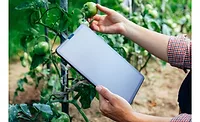Domestic Mutual Reliance Formally Expands to Three More States

Credit: MapChart.net via MapChart.net
The U.S. Food and Drug Administration (FDA) is dedicated to keeping consumer trust in food safety, along with the help of our regulatory partners. With this goal in mind, I am happy to announce that three additional states have formalized their domestic mutual reliance partnerships with FDA: Minnesota,1 Virginia,2 and Iowa.3 This brings our total to seven states that have signed domestic mutual reliance partnership agreements1 with FDA to advance collaborative activities to help ensure continued access to safe foods.
Building a culture of food safety is vital to our shared mission to protect consumers and reduce foodborne illness. Domestic mutual reliance,5 part of FDA's New Era for Smarter Food Safety initiative, is a key component of the Integrated Food Safety System.6 It enables FDA and states with comparable regulatory systems to rely on each other for a safer national food supply.
By moving toward an integrated food safety system with our state partners, we can more efficiently coordinate inspections, share data, and respond to foodborne outbreaks. We work together as one, integrated workforce to update our respective inventories, coordinate inspectional assignments, and exchange program data to maximize public health protection and ensure a safe food supply. FDA collaborates with state partners on engagement, regulatory oversight, and outreach to industry and food safety stakeholders to ensure that our programs deliver high-quality, risk-based regulatory program services.
Through these efforts, we are detecting foodborne outbreaks and food safety issues more quickly and with more precision. For example, earlier this year, improved federal-state collaboration facilitated a joint investigation with the U.S. Centers for Disease Control and Prevention (CDC), the Georgia Department of Agriculture, and the Michigan Department of Agriculture into a multistate Listeria outbreak linked to packaged leafy greens. The firm issued two voluntary recalls, stopped using the equipment, and temporarily halted production. The CDC then declared the outbreak over.
These new partnership agreements contain several enhanced elements. For example, our Minnesota Department of Agriculture partnership is the first such agreement to cover both animal and human food. This will help leverage resources and lessons learned between our human and animal food regulatory program systems in Minnesota for greater efficiency and effectiveness. Together, we will oversee the safety of food for people, as well as for the millions of animals in the state, including chickens, turkeys, cows, pigs, sheep, fish, dogs, cats, and horses. Regulating animal feed, in turn, also helps make the human food supply safer.
Fifteen percent of the U.S. food supply is imported from around the world. FDA uses every tool at its disposal, including collaboration with our state partners, to ensure that our food industries and the American public receive safe ingredients and food—whether they are produced in the U.S. or abroad. The Virginia Department of Agriculture and Consumer Services agreement will continue to advance cross-cutting approaches that help us strengthen our response time and actions to address any concerns related to domestic and imported foods.
In Iowa, FDA and the state’s food regulatory program consistently share information to ensure that all facilities, especially those that produce high-risk products like foods with multiple major allergens, are inspected in a timely manner. Iowa also will explore ways to leverage technology to expand information-sharing as we work together to more efficiently respond to incidents and emergencies and investigate outbreaks and complaints.
Looking for quick answers on food safety topics?
Try Ask FSM, our new smart AI search tool.
Ask FSM →
All seven domestic mutual reliance partnership agreements advance collaboration and support efforts to manage regulated facility inventories to minimize inspection duplication. Maximizing efficiency and reducing duplication enable all of us to redirect resources, where needed, to other emergencies and emerging issues. This results in more responsible use of taxpayer dollars. This efficiency also enables us to better focus on prevention efforts like working with our industry partners to continue building a food safety culture. This kind of accountability is important and drives a great deal of how FDA operates.
In addition, domestic mutual reliance means that industry will receive more consistent information on the observations following an inspection by the state and FDA. This is helpful to regulated companies, as a coordinated approach avoids misunderstandings that ultimately could delay essential oversight. Overall, we strive to show a unified front to the firms we work with, and that is a large component of our domestic mutual reliance efforts.
The three new domestic mutual reliance partnership agreements represent a major step to enhance food safety across the nation. Our partners have worked with us to create an environment of respect, trust, and openness to sharing ways to improve. FDA deeply appreciates these relationships as we move forward toward our joint vision of a food supply that is safe for all Americans.
I encourage additional states to engage in our domestic mutual reliance efforts. More information about domestic mutual reliance is available on FDA’s website.5
- U.S. Food and Drug Administration (FDA). "Partnership Agreement between the U.S. Food and Drug Administration Division of Human and Animal Food West 1 and the Minnesota Department of Agriculture." MOU 225-22-008. February 2, 2022. https://www.fda.gov/about-fda/domestic-mous/mou-225-22-008.
- FDA. "Partnership Agreement between the U.S. Food and Drug Administration and the Virginia Department of Agriculture and Consumer Services—Division of Animal and Food Industry Services, Office of Dairy and Foods, Food Safety Program." MOU 225-22-023. September 30, 2022. https://www.fda.gov/about-fda/domestic-mous/mou-225-22-023.
- FDA. "Partnership Agreement between the U.S. Food and Drug Administration and the Iowa Department of Inspections and Appeals (DIA), Food and Consumer Safety." MOU 225-22-022. July 18, 2022. https://www.fda.gov/about-fda/domestic-mous/mou-225-22-022.
- Food Safety Matters Podcast. "Ep. 112. Rogers, Mettler, Waller: FDA and Utah on an Integrated Workforce through Mutual Reliance." Food Safety Magazine. February 8, 2022. https://www.food-safety.com/articles/7542-ep-112-rogers-mettler-waller-fda-and-utah-on-an-integrated-workforce-through-mutual-reliance.
- FDA. "Domestic Mutual Reliance." November 14, 2022. https://www.fda.gov/federal-state-local-tribal-and-territorial-officials/national-integrated-food-safety-system-ifss-programs-and-initiatives/domestic-mutual-reliance.
- FDA. "National Integrated Food Safety System (IFSS) Programs and Initiatives." July 4, 2022. https://www.fda.gov/federal-state-local-tribal-and-territorial-officials/national-integrated-food-safety-system-ifss-programs-and-initiatives.








